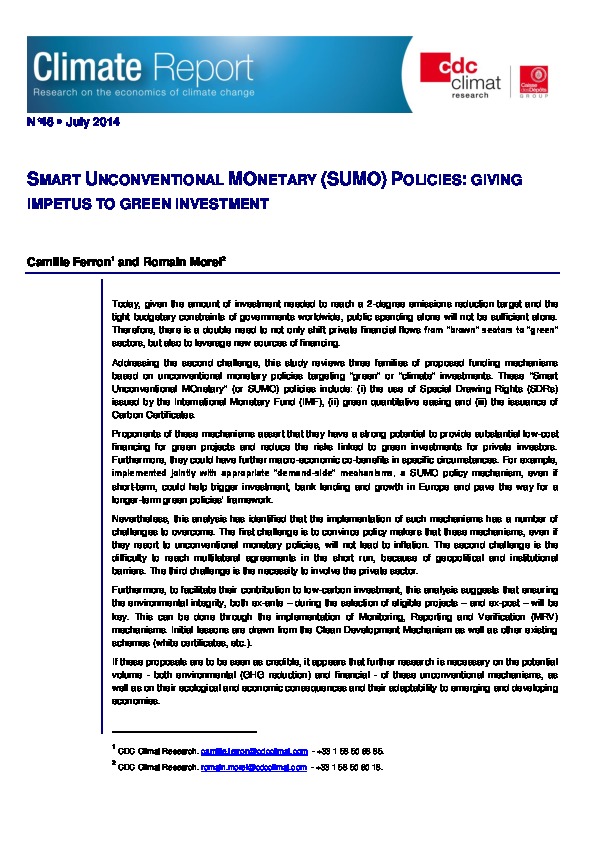Smart Unconventional Monetary (SUMO) policies: giving impetus to green investment
Today, given the amount of investment needed to reach a 2-degree emissions reduction target and the tight budgetary constraints of governments worldwide, public spending alone will not be sufficient alone. Therefore, there is a double need to not only shift private financial flows from “brown” sectors to “green” sectors, but also to leverage new sources of financing.
Addressing the second challenge, this study reviews three families of proposed funding mechanisms based on unconventional monetary policies targeting “green” or “climate” investments. These “Smart Unconventional MOnetary” (or SUMO) policies include: (i) the use of Special Drawing Rights (SDRs) issued by the International Monetary Fund (IMF), (ii) green quantitative easing and (iii) the issuance of Carbon Certificates.
Proponents of these mechanisms assert that they have a strong potential to provide substantial low-cost financing for green projects and reduce the risks linked to green investments for private investors. Furthermore, they could have further macro-economic co-benefits in specific circumstances. For example, implemented jointly with appropriate “demand-side” mechanisms, a SUMO policy mechanism, even if short-term, could help trigger investment, bank lending and growth in Europe and pave the way for a longer-term green policies’ framework.
Nevertheless, this analysis has identified that the implementation of such mechanisms has a number of challenges to overcome. The first challenge is to convince policy makers that these mechanisms, even if they resort to unconventional monetary policies, will not lead to inflation. The second challenge is the difficulty to reach multilateral agreements in the short run, because of geopolitical and institutional barriers. The third challenge is the necessity to involve the private sector.
Furthermore, to facilitate their contribution to low-carbon investment, this analysis suggests that ensuring the environmental integrity, both ex-ante – during the selection of eligible projects – and ex-post – will be key. This can be done through the implementation of Monitoring, Reporting and Verification (MRV) mechanisms. Initial lessons are drawn from the Clean Development Mechanism as well as other existing schemes (white certificates, etc.).
If these proposals are to be seen as credible, it appears that further research is necessary on the potential volume – both environmental (GHG reduction) and financial – of these unconventional mechanisms, as well as on their ecological and economic consequences and their adaptability to emerging and developing economies.
